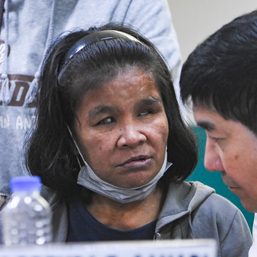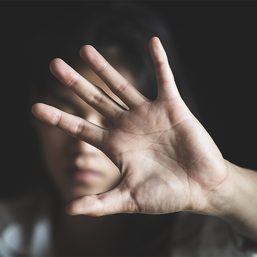SUMMARY
This is AI generated summarization, which may have errors. For context, always refer to the full article.

The Supreme Court affirmed that marital infidelity, which results in proven emotional anguish, was a form of violence subject to penalties under Republic Act 9262 or the Anti-Violence Against Women and Children (VAWC).
In a decision released October 21, the Supreme Court First Division upheld lower court rulings and sentenced a man to 6 months to 8 years in prison for cheating on his wife and causing her emotional anguish.
The man was also ordered to pay P100,000 in fine, and P25,000 in moral damages.
“Further, (the man) is directed to undergo a mandatory psychological counselling or psychiatric treatment, and to report his compliance therewith to the court of origin within 15 days after the completion of such counselling or treatment,” said the decision penned by Chief Justice Diosdado Peralta, with concurrences from Associate Justices Benjamin Caguioa, Jose Reyes Jr, Amy Lazaro-Javier.
“(The wife), who only intended to bring justice to what happened to her, was able to testify and to show through her testimony that due to (the husband’s) act of infidelity and failure to stay true to his promise, she suffered emotional and psychological harm,” said the Supreme Court.
Emotional anguish
The pertinent provision is Section 5(i) of VAWC which counts as a crime of violence against a woman or a child “causing mental or emotional anguish, public ridicule or humiliation including, but not limited to, repeated verbal and emotional abuse, and denial of financial support or custody of minor children of access to the woman’s child/children.”
The man was convicted by a Las Piñas court in 2017 for violation of Section 5(i). This ruling was upheld by the Court of Appeals (CA) in 2019, prompting the man to go to the Supreme Court.
The man argued before the Supreme Court that there was no proof beyond reasonable doubt that his wife indeed suffered mental and emotional anguish, and that his having a mistress caused that anguish.
The couple were married in 1989. In 2007, the wife found out her husband was having an affair with a woman in Zamboanga.
In a lower court hearing, the husband said it was because he “cannot stand her character anymore.”
The wife filed a concubinage complaint against her husband, but this did not prosper because the husband and the mistress “committed never to see each other again.”
In November of 2007, the husband disappeared, and the wife would find out he had returned to his mistress.
According to the wife, the mistress sent messages saying the husband was sick and needed money for medicines, and that the mistress supposedly threatened to kill the husband.
The wife, thinking that the mistress has held her husband hostage, even filed for a petition for the writ of habeas corpus, an extraordinary writ usually used by activists who are illegally detained. The Court of Appeals, where the petition was filed, had gone the length of deputizing the National Bureau of Investigation (NBI) to investigate.
But this is what the NBI found out: The husband had willingly left the wife to be with his mistress, and the couple already had 3 children of their own. The petition for the writ of habeas corpus was dismissed.
The wife presented a psychologist as an expert witness to say that she was having “depressed mood, occasional difficulty in sleeping” because of what happened.
According to the CA: “Psychological violence as an element of the crime, and the mental and emotional anguish she suffered, were proven through the testimonies (of the wife and the psychologist).”
“RA 9262 does not criminalize acts such as marital infidelity per se, but the psychological violence causing mental or emotional suffering on the wife,” said the CA.
Unrequited love
The Supreme Court, not being a trier of facts, said it did not want to disturb the findings of the lower court, which had the chance to personally examine the wife and the husband, and therefore was in better position to judge who was telling the truth.
In the lower court, the wife was grilled whether she was just suing the husband as a vengeance for “not loving you back.”
“No it’s not,” the wife had said.
The wife was also asked if she filed the case so her husband would return to her.
“I think no more because until now I know, he doesn’t love me anymore because he wants to stay with another woman. So I want him to be punished so that he will know how it feels to be hurt, both of them,” said the wife.
“He must be put in jail so that he knows.. he had done something wrong to me, because I love him so much, but then, he has different attitudes.. I want to put him in jail, that’s all,” the wife had told the lower court.
The Supreme Court affirmed that “marital infidelity, which is a form of psychological violence, is the proximate cause of (the wife’s) emotional anguish and mental suffering.”
The Supreme Court said “the law does not require proof that the victim became psychologically ill due to the psychological violence done by her abuser.”
“(The husband) can only offer the defense of denial. The defense of denial is inherently weak and cannot prevail over the positive and credible testimonies of the prosecution witnesses that the accused committed the crime,” the Supreme Court added. – Rappler.com
Add a comment
How does this make you feel?


![[Free to Disagree] Arrest Quiboloy!](https://www.rappler.com/tachyon/2024/03/Free-to-disagree-arrest-quiboloy-March-11-2024-1.jpg?resize=257%2C257&crop_strategy=attention)

There are no comments yet. Add your comment to start the conversation.